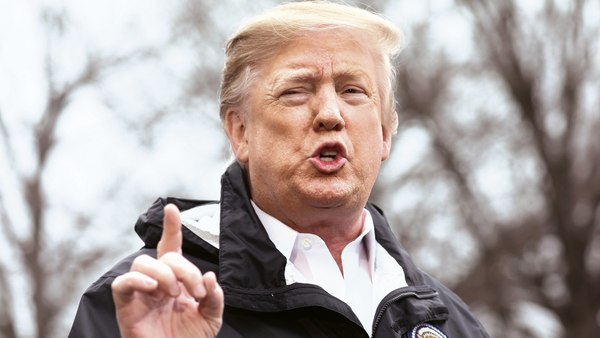
US President Donald Trump said Tuesday it was “no longer acceptable” for India to continue putting tariffs on products made in the United States. In a tweet, Trump, who has already slapped sanctions on countries including Iran and is waging a trade war, involving tariffs, with China, said: “India has long had a field day putting Tariffs on American products.
Earlier in 2019, Trump’s administration had stripped New Delhi of a preferential status that exempted products worth billions of dollars made in India from US levies. Back on June 15, India said it would impose higher retaliatory tariffs on 28 US products, including almonds, apples, and walnuts, following Washington’s withdrawal of key trade privileges for New Delhi.
The new duties take effect from June 16, a government notification said, in the latest trade row since Trump took office in 2017 vowing to act against countries with which Washington has a large trade deficit. From June 5, the US president scrapped trade privileges under the Generalized System of Preferences (GSP) for India, the biggest beneficiary of a scheme that allowed duty-free exports of up to $5.6 billion. India termed that “unfortunate” and vowed to uphold its national interests.
Reuters previously reported India was preparing to levy higher tariffs ahead of Prime Minister Narendra Modi’s first meeting with Trump on the sidelines of a G20 summit in Japan on June 28 and 29. India initially issued an order in June last year to raise import taxes as high as 120% on a slew of US items, incensed by Washington’s refusal to exempt it from higher steel and aluminium tariffs.
But New Delhi repeatedly delayed raising tariffs as the two nations engaged in trade talks. Trade between them stood at about $142.1 billion in 2018. India had amended its previous order “to implement the imposition of retaliatory duties on 28 specified goods originating in or exported from USA”, while preserving the existing rate for these goods for all other countries, the government notification said.
Higher Indian tariffs on US goods could impact growing political and security ties between the two nations.
US Secretary of State Mike Pompeo had said Washington was open to dialogue to resolve trade differences with India, through greater access for American companies to its markets.
India is by far the largest buyer of US almonds, paying $543 million for more than half of US almond exports in 2018, US Department of Agriculture data shows. It is the second largest buyer of US apples, taking $156 million worth in 2018.
New Delhi’s new rules in areas such as e-commerce and data localization have already angered the US and hit companies such as Amazon.com, Walmart Inc, Mastercard, and Visa, among others.
Separately, the US and China are set to relaunch trade talks this week after a two-month hiatus but, a year after their trade war began, there is little sign their differences have narrowed.
Call ‘expected this week’
After meeting with Chinese President Xi Jinping in Japan just in late June, Trump agreed to suspend a new round of tariffs on $300 billion worth of imported Chinese consumer goods while the two sides resumed negotiations.
Trump said then that China would restart large purchases of US agricultural commodities, and the US would ease some export restrictions on Chinese telecom equipment giant Huawei Technologies.
But sources familiar with the talks and China trade watchers in Washington say the summit did little to clear the path for top negotiators to resolve an impasse that caused trade deal talks to break down in early May.
A US official said last week the discussions were expected to resume with a phone call between US Trade Representative Robert Lighthizer, Chinese Vice Premier Liu He and Treasury Secretary Steven Mnuchin.
A USTR spokesperson said the call was expected this week but gave no further details.
The United States is demanding that China make sweeping policy changes to better protect American intellectual property, end the forced transfer and theft of trade secrets, and curb massive state industrial subsidies.



